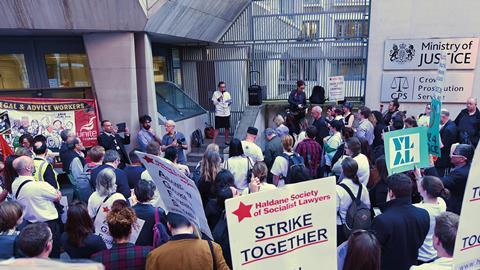Ten years on from the implementation of LASPO, legal aid practitioners continue to bemoan its impact on clients and society. Has the time come for an NHS-style National Legal Service?
In the House of Commons, on 15 November 2010, lord chancellor Kenneth Clarke announced proposals to reform civil legal aid. The system as it then was bore little resemblance to the one introduced (by Attlee’s government) in 1949, he said.
Legal aid had expanded so much that it was one of the most expensive systems in the world and costing the public purse more than £2bn a year. The Ministry of Justice’s budget was also being slashed by 23% over four years. ‘Legal aid needs to make a substantial contribution to that reduction,’ Clarke said.
Passage of the coalition government’s bill through parliament was turbulent. ‘I was proud to be Labour’s lead in the House of Lords,’ Lord Bach (Willy Bach) told a Legal Action Group event in Westminster this week. ‘We managed to knock out first time round many of its worst clauses – only for them to be put back by the government in the House of Commons.’
The Legal Aid, Sentencing and Punishment of Offenders Act duly came into force on 1 April 2013, cutting vast areas of civil law from the scope of legal aid.
The coalition government estimated that its reforms would save in the region of £350m in 2014/15. ‘It is clear that significant savings have been made to the legal aid fund over the time in which the LASPO changes were implemented,’ a post-implementation review of LASPO concluded five years later.
Huge savings were indeed achieved. But at what cost?
‘Did the level and cause of need suddenly disappear?’ Melanie Gonga, director and head of legal practice at Springfield Advice and Law Centre, asked at the Legal Action Group event. ‘If anything, the needs our clients present have become more complex and multi-faceted.’
The cuts appear to make no economic sense, Monday’s event heard. For instance, LASPO severely restricted the scope of legal aid for housing disrepair. Damages arising from a housing disrepair claim are out of scope.
‘If legal aid was available for the compensation element of a claim, we could pursue a rogue landlord, they would pay and we would not bill the Legal Aid Agency a penny’, said Rosaleen Kilbane, a founding partner of Birmingham-based The Community Law Partnership.
The number of applications to represent people in disrepair cases plummeted, Simon Mullings, co-chair of the Housing Law Practitioners Association, added. ‘Now we learn that local authorities and housing associations are surprised by the state of their housing stock. The reason they did not know that is because we were not knocking on their door to say “Sort it out or you will be taken to court”.’
'If legal aid was available for the compensation element of a [housing disrepair] claim, we could pursue a rogue landlord, they would pay and we would not bill the Legal Aid Agency a penny'
Rosaleen Kilbane, The Community Law Partnership
LASPO has also taken an emotional toll on the sector.
The Community Law Partnership employs a client coordinator whose job is to obtain as much information from those seeking help. The firm then has to decide which cases to take on. ‘It’s the most heartbreaking thing, the worst part of the job,’ said Kilbane. ‘All of these cases are desperate. We have to decide which case is the most desperate. [We] have to do it because there are not enough of us.’
There are 2.8 million people in Greater Manchester, noted Jason Tetley, director of Greater Manchester Law Centre, but the law centre is aware of only three free-to-access employment specialist advisers. ‘That’s one employment adviser for every million residents in the Greater Manchester region.’ The law centre is also regularly approached by people from Staffordshire, Cheshire and Lancashire.
'Local authorities and housing associations are surprised by the state of their housing stock. The reason they did not know that is because we were not knocking on their door to say ‘Sort it out or you will be taken to court'
Simon Mullings, Housing Law Practitioners Association
The government’s legal support action plan, published alongside its post-implementation review in 2019, at least recognised the importance of early intervention. ‘There are too many people entangled in the justice system for a variety of issues, and some may not necessarily need to be there,’ then lord chancellor David Gauke said. ‘Our ambition must be to give people the tools to resolve their problems well before this point, before they become legal problems that require a court visit and a lawyer. Early intervention is key, and it is upon this that our new vision for legal support is founded.’
However, steps taken by the government since then are widely seen as sticking plasters to cover a gaping wound that requires immediate – and major – surgery.
The government has been piloting early legal advice on housing, debt and welfare benefits in Manchester and Middlesbrough. But before the pilot even got off the ground Legal Aid Practitioners Group chief executive Chris Minnoch described it as a ‘lost opportunity’ to demonstrate the positive impact of legal aid.
Advice and assistance is capped at three hours. This would limit the ability of providers to give the type of help clients need and limit the data being collected, Minnoch warned. Piloting different levels of early intervention in different geographical areas would have been a better strategy.
Lord McNally – ‘no regrets’
Liberal Democrat peer Lord McNally (Tom McNally) was justice minister from 2010 and 2013, steering LASPO through the House of Lords. The Gazette asked him if he still believes the cuts to legal aid were necessary and the right thing to do as a consequence of austerity – and whether he would have done anything differently: ‘In the context of the need in 2010 to stabilise government spending I have no regrets. Both Conservative and Labour governments had put curbs on legal aid spending.

‘When I became an MoJ minister I discussed legal aid with Lord (Jeremy) Hutchinson QC, who had been on the original commission advising the Attlee government about setting up legal aid. Jeremy told me: “Our aim was to set up a National Health Service for the law.” That was a noble aspiration but, like the health service itself, legal aid expenditure cannot be limitless. Where are the ideas and initiatives for reform from a [justice system] still beset by Hamlet’s “the law’s delay”? We need a grown-up debate about the size of aid budget we are willing to fund and what should be prioritised within that budget. That needs practical reforms to promote the efficiencies which would enable whatever legal aid budget is agreed has maximum impact on access to justice.
‘A long answer, I know. But getting legal aid right is going to need honesty from politicians about what we are willing to spend on legal aid and a response from all parts of the [justice system], including the judiciary and the lawyers, to ensure access to justice gets where it is most needed.’
The government has been tendering for new housing loss prevention advice service contracts, to replace the existing housing possession court duty scheme this year. The new scheme will offer legal advice on social welfare law matters before court as well as on-the-day advice and representation in court. However, the Legal Aid Agency had to issue a fresh call for bids after failing to receive ‘compliant’ tenders in 12 procurement areas, including Bedford, Crewe, Darlington, Hull, Liverpool, Teesside and Wigan.
The government estimates that 2 million more people will have access to civil legal aid when means test thresholds are raised. But who will provide the support? In April 2012 there were 2,134 civil legal aid providers. In February 2022, there were 1,369.
A major review of civil legal aid was announced at the beginning of this year. However, it emerged that final policy decisions are not expected until late 2024.
Solicitors Roger Smith, a former director of Justice and long-time Gazette columnist, and Nic Madge believe the time has come to ‘start again with a new vision’: a National Legal Service. This would put the interests of people with legal problems first, ‘in the same way that the National Health Service puts the interests of people with health problems first’.
Its functions would be divided into three tiers: initial early information and advice; digital plus; and representation in negotiations and litigation.
Law centre finances would be placed on a sustainable, long-term footing and national charities that provide legal advice and representation would be brought within the National Legal Services brand. The future potential of artificial intelligence services such as ChatGPT and Google Bard ‘could play a significant role in providing legal services in appropriate solutions’.
Levies imposed on the highest-earning members of the legal profession and wealthy litigants in the High Court and above would help provide a sustainable basis for funding.
The blueprint was unveiled at Monday’s event. Smith and Madge said their paper sets out proposals that could be incorporated into the manifesto of any political party seeking to form the next government. Lord chancellor Dominic Raab and his shadow Steve Reed were not present at Monday’s event, though shadow attorney general Emily Thornberry and Labour MPs Andy Slaughter and Rebecca Long-Bailey were.
1 April has been dubbed in the media ‘April Cruel Day’, with household bills set to soar. Also an apt nickname for the day LASPO turns 10?
































5 Readers' comments